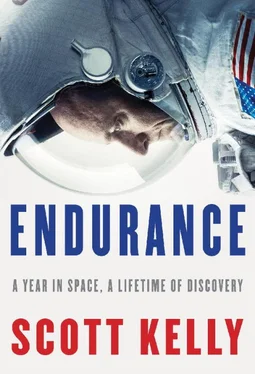While I’m running, Gennady comes by to check on something. There are some shit cans temporarily stored in a big bag on the floor of Node 1, waiting to go out on the outgoing Progress with the rest of the garbage, and Gennady had noticed they were smelling a bit. He checks one of the lids to make sure it’s sealed properly, only to accidentally liberate a cloud of toxic gas that nearly knocks me off the treadmill. It makes me think of the Monty Python sketch where everyone triggers one another to throw up. The entire U.S. segment smells wretched for a while, but I’m impressed by how quickly the system filters the air.
“As soon as I get back to Earth,” Gennady mutters in Russian, “I am going on a vacation.”
Soon after he leaves, I hear the voice of mission control.
“Station, Houston on Space to Ground Two. We are privatizing the space-to-ground channel. The flight director needs to speak to you.”
We are privatizing. These are words that make any astronaut’s blood freeze. They mean something bad has happened. I bring the treadmill to a stop, unhook myself, and grab the mic to talk to Houston.
The last time I heard “we are privatizing” was when SpaceX blew up. The time before that, my daughter Samantha was having a personal crisis. And of course on my last mission, the news that we were privatizing came when my sister-in-law was shot. I wait anxiously to find out what has gone wrong.
I hear the capcom on duty, Jay Marschke, refer to the trajectory operations officer (TOPO). For a moment, I’m relieved; at least it has nothing to do with my family.
“This is a red late-notice conjunction,” Jay says, “with a closest point of approach within a sphere of uncertainty.”
“Roger,” I say into the microphone. Then I make sure the microphone is off before I say what I really think about this, which is, “ Fuck. ”
A “conjunction” is a potential collision—a piece of space junk is headed our way, in this case an old Russian satellite. “Late notice” means we didn’t see it coming or that we miscalculated its trajectory, and “red” means it’s going to get dangerously close—we just don’t know how close. The “sphere of uncertainty” refers to the area it could pass through, a sphere with a radius of one mile. Because the impact could depressurize the station, letting our air out and killing us all, we will have to head to the Soyuz and use it as a possible lifeboat. If the debris streaking toward us collides with us, we will likely all be dead in two hours.
“How about relative velocity?” I ask. “Any idea?”
“Closing velocity of fourteen kilometers per second,” comes the answer.
“Copy,” I say into my headset. (“Fuck,” I say, again, to myself.) This is the worst possible answer to my question. If the satellite were in an orbit similar to ours, the closing speed might be as low as a few hundred miles per hour—a devastating speed for a car crash, but a best-case scenario for a space crash. Instead, the space station is traveling in one direction at 17,500 miles per hour, and the space junk is traveling at the same speed in the exact opposite direction; a 35,000-mile-per-hour closing rate—twenty times faster than a bullet from a gun. If the satellite hits, the resulting destruction would be much worse than what happens in the movie Gravity.
With six hours’ notice, the space station can move itself out of the way of oncoming orbital debris. The Air Force tracks the position and trajectory of thousands of objects in orbit—mostly old satellites, whole or in chunks. As with everything else, NASA has an abbreviation for these adjustments: PDAM, or predetermined debris avoidance maneuvers, which means firing the station’s engines to adjust its orbit. We’ve had two of this type since I’ve been up here. Today, however, is different. With only two hours’ notice, a PDAM will not be possible.
Mission control directs me to close and check all the hatches on the U.S. segment of the space station. I trained to do this in my preparations for this mission, and I run through the procedure in my mind in order to complete the steps properly and—most important—quickly. Even the hatches that were already closed need to be checked, like the unused berthing ports for visiting vehicles. With the hatches closed, if one module is hit, the others might survive—or at least their contents won’t be sucked out into the vacuum of space. There are eighteen hatches on the U.S. segment that must be closed or checked. While I’m working through the hatches as efficiently as I can, I get a call from mission control.
“Scott, Misha, it’s time to get ready for your event with WDRB in Louisville, Kentucky.”
“What?” I ask, incredulous. “Is there really time to be doing this?”
Misha shows up in the U.S. lab for our joint public affairs event, as he always does, with no time to spare but right on time.
“Public affairs events can’t be canceled,” comes the answer. The anchors want to ask us about watching the Kentucky Derby, which was almost two months ago. This is insane.
“Are they fucking kidding?” I say to Misha. He shakes his head in response. This is a bad decision, but it’s also not a great time to get into an argument with the ground.
Misha and I get into position in front of the camera with the handheld microphone.
“Station, Houston, are you ready for the event?” Jay asks.
“We are ready for the event,” I answer, struggling to keep the annoyance out of my voice. We spend the next five minutes answering questions about what we think of the probe that just reached Pluto, what landmark we may be passing over, and whether we got to watch the Kentucky Derby back in May. This kind of interview is part of our job, but today we can’t help but grit our teeth.
When we are asked about maneuvering in weightlessness, we turn somersaults for the Louisville viewers before signing off, still feeling pissed off that we had to waste our time this way, given the magnitude of the situation we are in. There is danger in becoming too complacent about the reality of life on an orbiting space station, and the decision to go ahead with this interview is, to me, clearly a symptom of that.
As soon as the cameras are off, I get back to checking that the hatches are closed. Luckily there are no serious issues with any of them—I don’t have the time to fix any problems. I collect the items from the U.S. segment that we will need most if a collision destroys that part of the station: the defibrillator, the advanced life support medical kit, my iPad with important procedures on it, my iPod, and a bag of personal items. I also make sure I have my thumb drive of images and videos from Amiko that I wouldn’t want to lose track of. By the time I have gathered all my important items, we have about twenty minutes to spare before potential impact.
I go to the Russian segment, where I see that the cosmonauts have not bothered with closing their hatches. They think closing the hatches is a waste of time, and they have a point. The two most likely scenarios are that the satellite will miss us, in which case closing the hatches will have been pointless, or it will hit us, in which case the station will be vaporized in an instant, and it won’t make a bit of difference if the hatches are open or closed. It is incredibly unlikely that one module could be hit and the others survive intact, but just in case, mission control has me spend more than two hours preparing for that eventuality; the Russian approach is to say fuck it and spend what might be their last twenty minutes having lunch. I reach my crewmates in time to join them for a small can of Appetizing Appetizer.
Ten minutes before potential impact we make our way to the Soyuz, which Gennady has prepared for flight in case we have to detach from the station. It’s orbital night now and dark in the Soyuz as we each slide into our seats. It’s cramped and cold and loud.
Читать дальше












